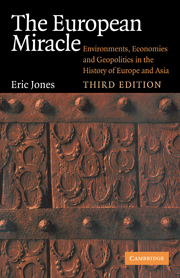Book contents
- Frontmatter
- Contents
- Preface to the third edition
- Preface and acknowledgements
- Introduction to the second edition
- Map
- EURASIA
- 1 Environmental and social conjectures
- 2 Disasters and capital accumulation
- EUROPE
- THE WORLD
- ASIA
- EURASIA
- Afterword to the third edition
- Annotated bibliographical guide to Eurasian economic history in the very long term
- Bibliography
- Supplementary bibliographical guide
- Index
2 - Disasters and capital accumulation
Published online by Cambridge University Press: 05 June 2012
- Frontmatter
- Contents
- Preface to the third edition
- Preface and acknowledgements
- Introduction to the second edition
- Map
- EURASIA
- 1 Environmental and social conjectures
- 2 Disasters and capital accumulation
- EUROPE
- THE WORLD
- ASIA
- EURASIA
- Afterword to the third edition
- Annotated bibliographical guide to Eurasian economic history in the very long term
- Bibliography
- Supplementary bibliographical guide
- Index
Summary
The old tropical civilizations had to struggle with innumerable difficulties unknown to the temperate zone, where European civilization has long flourished. The devastations of animals hostile to man, the ravages of hurricanes, tempests, earthquakes, and similar perils, constantly pressed upon them
Henry Buckledisasters may be looked on as abrupt shocks to the economic system. Whether they arise naturally, from sudden instabilities of the earth's crust or atmosphere, or from outbreaks of disease in humans, animals, or crops, or as social disasters such as wars and accidents, there seems no practical alternative to an osmotic definition, for the effects are in any case functions of the technological specifications in which they occur and the social and economic systems which play host to them. They are not, in truth, completely exogenous acts of God divorced from the choices made by man. For example, the density of human populations, their income level and social organisation, the crops they grow and the animals they keep, all affect the degree of vulnerability to particular shocks, and the impact they will have.
Historically there is a further complication in the paucity of hard evidence on the frequency and severity of disasters which prevents us from drawing up a firm balance sheet, while even with a full record of physical losses the economic consequences would be difficult to calculate. With certain exceptions, such as early modern famines, some outstanding epidemics like the Black Death, wars (and then with little systematic concern for the effects), and the Great Fire of London (as if it were the unique urban conflagration), few types of shock to the economy are discussed by historians.
- Type
- Chapter
- Information
- The European MiracleEnvironments, Economies and Geopolitics in the History of Europe and Asia, pp. 22 - 42Publisher: Cambridge University PressPrint publication year: 2003

